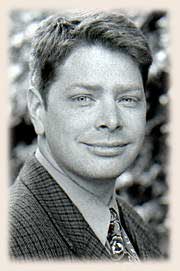| SOIL,
FOOD, & PEOPLE CONFERENCE
March 27-29, 2000
GROW BIOINTENSIVE conference on the U.C. Davis campus
Home
| Intro | Presentations
| Breakout Sessions | Friends:
Old & New | Sponsors
PRESENTATIONS
WATER: ITS CONTEXT IN SUSTAINABLE AGRICULTURE
Jaimie Dunn
 |
Jaimie Dunn works with The Council
of Canadians, a public interest watchdog group with 100,000
members. |
Dunn talked about the worldwide crisis in water
and stated that "corporations, with the help of governments,
are lining up to cash in on the situation," which could speed
up the course of a water-scarce future. He said the World Bank has
called potential world water sales a $800 billion business. He added
that water privatization always leads to huge layoffs and a lack
of public information about water quality.
Dunn noted corporations are gearing up to transport
massive amounts of Canadian water to the U.S., Asia and the Middle
East by supertanker, pipeline and diversion of river systems. "Bladders"
now being constructed to be filled fresh water and towed behind
tankers are 7 football fields long and 4 football fields wide.
Dunn also talked about the bottled water industry,
one of the fastest growing industries in the world. In many Canadian
communities, bottled water companies have obtained the right to
tap water out of underground aquifers, even when those communities
are experiencing water shortages. The high cost of bottled water,
particularly in the Far East where it sells for about $7 a quart,
makes this a lucrative business, even with transportation costs
taken into account.
Dunn mentioned the inefficiency of most water
systems and said that if current technologies were taken advantage
of, agriculture could save 50% of its water and industry could reduce
its water consumption by 50% to 90%. What is missing "is the
political will and vision." He said governments are not enacting
legislation to protect their water systems and in fact are encouraging
the commodification of water.
He described the challenges water faces
under World Trade Organization policies, which will prevent communities
from making decisions about their own water. Dunn ended by saying
we need to adopt a new water ethic based on knowing that water is
part of the earth's heritage and must be preserved not only for
the future generations themselves, but also for the world ecosystems.
He believes this can only occur through communities coming together
to make it happen.
top |